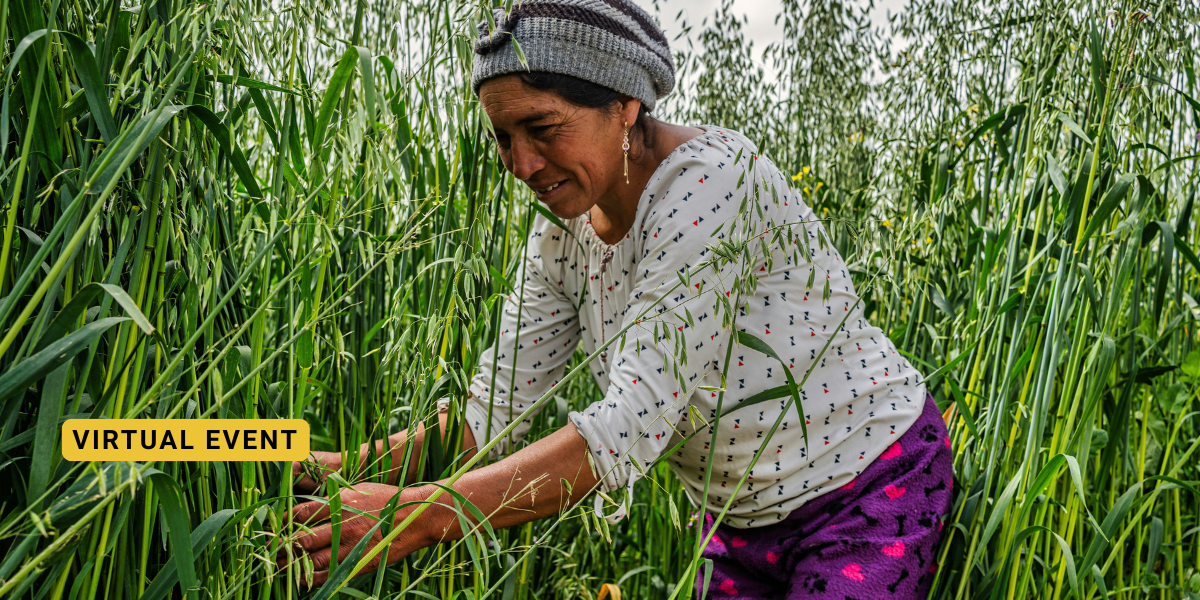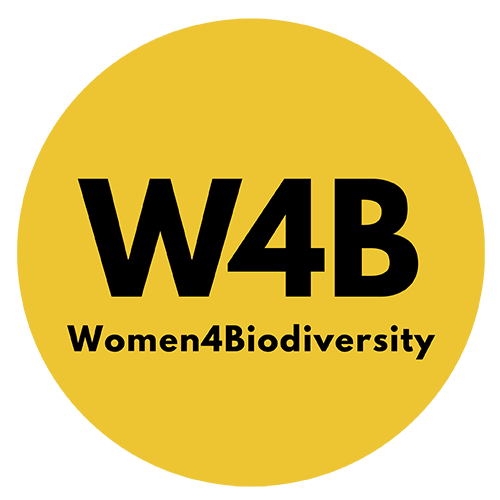WHAT
This webinar explores how gender, socio-cultural, and human rights considerations can be meaningfully integrated into the risk assessment and governance of synthetic biology. Featuring government representatives and researchers, the dialogue highlights intersectional and community-based approaches to ensure inclusive, ethical, and responsible decision-making in biosafety and biotechnology. This virtual event is organised by Women4Biodiversity and co-organised by Comisión Intersecretarial de Bioseguridad de los Organismos Genéticamente Modificados or the Intersecretariat Commission for Biosafety of Genetically Modified Organisms (Cibiogem) and Third World Network (TWN).
WHEN
Monday, 11 August 2025 at 8:00–9:00 AM (UTC−5). Please check your timezone here.
WHERE
Online event. Register for the event.
WHO
- Dr. Alejandro Espinosa Calderón, Executive Secretary, Cibiogem – Welcome remarks
- Dr. Humberto Peraza Villarreal, Deputy Director of Social Engagement and Socioeconomic Research, Cibiogem
- Dr. Consuelo López López, Director of Information and Research Promotion, Cibiogem
- David Eduardo Castro Garro, Director of the Directorate of Genetic Resources and Biosecurity, Government of Peru
- Lim Li Ching, Senior Researcher, Third World Network
- Dr Eva Sirinathsinghji, Researcher, Third World Network
- Alejandra Duarte, Policy & Research Associate, Women4Biodiversity – Moderator
WHY
- To analyze the historical development of synthetic biology and risk assessment within the United Nations Convention on Biological Diversity (UNCBD), highlighting key milestones, and decisions that have shaped its governance up to CBD COP16.
- To highlight how existing risk assessment methodologies for synthetic biology technologies fail to consider gendered, socio-economic, and cultural dimensions.
- To explore frameworks and practices that embed gender equality, human rights, and social inclusion into risk assessment, horizon scanning, and decision-making.
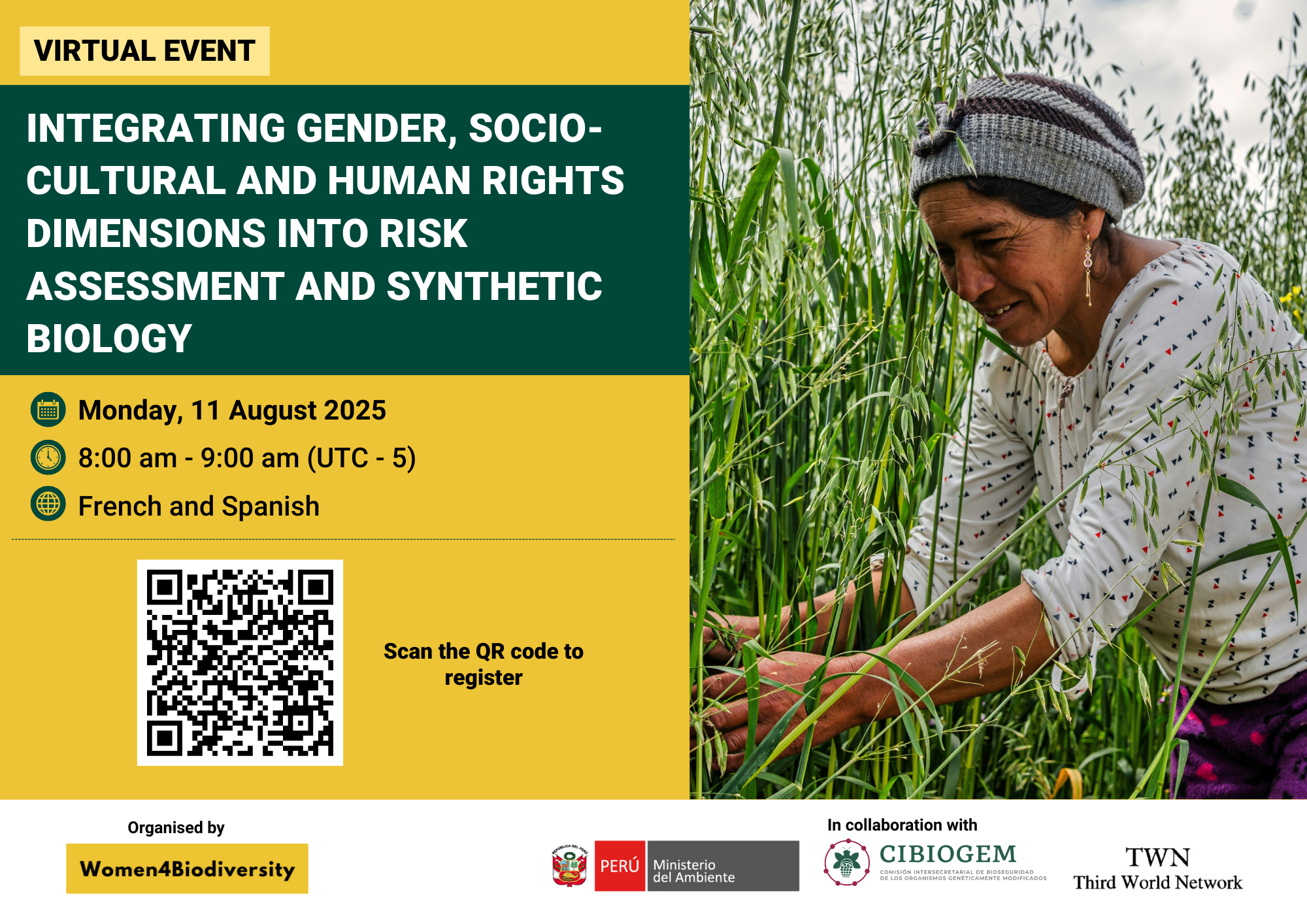
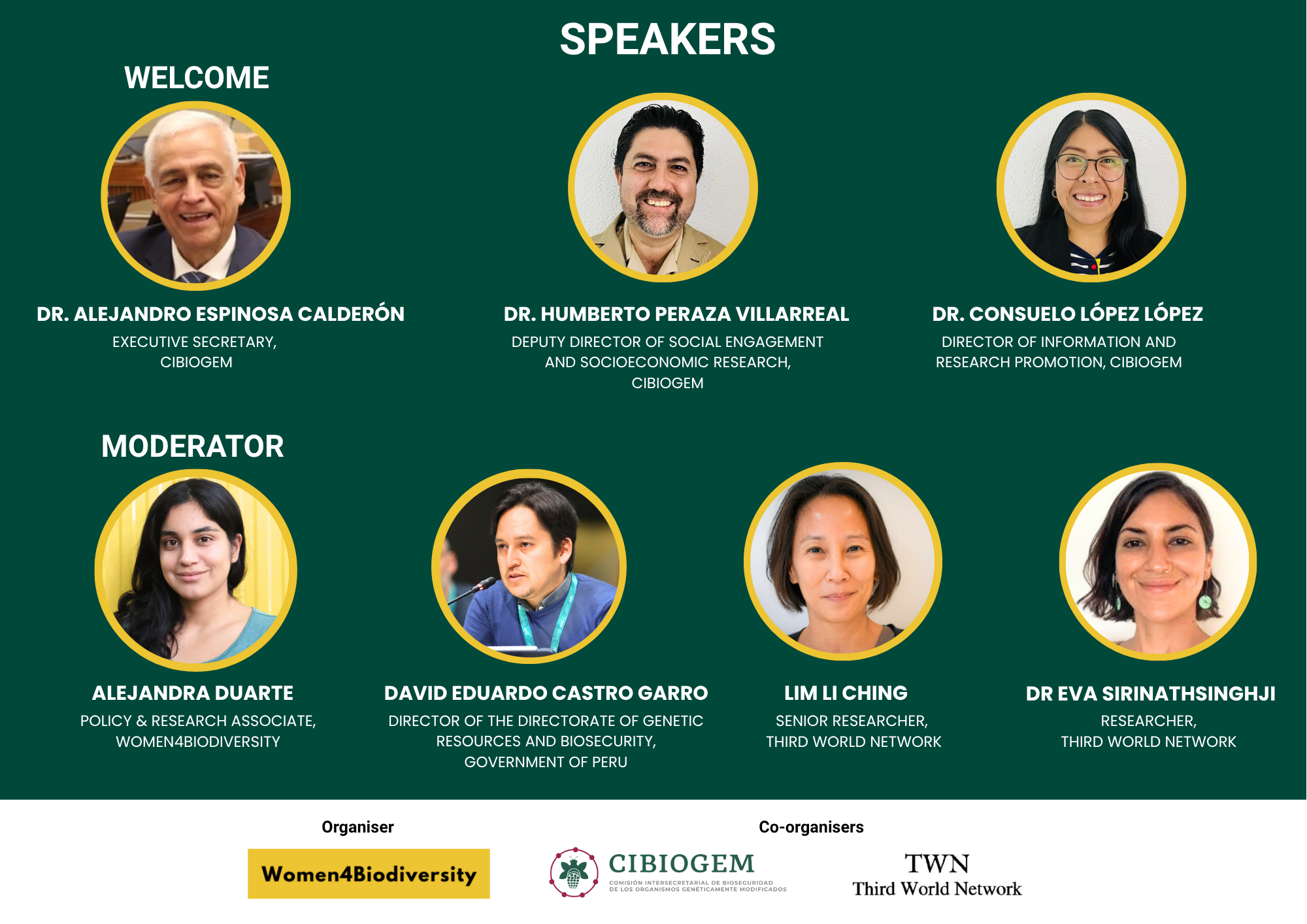
Espanol
QUÉ
Este seminario web explora cómo las consideraciones de género, socioculturales y de derechos humanos pueden integrarse de manera significativa en la evaluación de riesgos y la gobernanza de la biología sintética. Con la participación de representantes gubernamentales e investigadores, el diálogo destaca los enfoques interseccionales y comunitarios para garantizar una toma de decisiones inclusiva, ética y responsable en materia de bioseguridad y biotecnología. Este evento virtual está organizado por Women4Biodiversity y coorganizado por la Comisión Intersecretarial de Bioseguridad de los Organismos Genéticamente Modificados (Cibiogem) y la Red del Tercer Mundo (TWN).
CUÁNDO
Lunes, 11 de agosto de 2025, de 8:00 am – 9:00 am (UTC−5). Por favor, compruebe su zona horaria aquí.
DÓNDE
Evento en línea. Inscríbase en el evento.
QUIÉN
- Dr. Alejandro Espinosa Calderón, Secretario Ejecutivo de la Cibiogem – Bienvenida
- Dr. Humberto Peraza Villarreal, Subdirector de vinculación social e investigación socioeconómica, Cibiogem
- Dra. Consuelo López López, Directora de información y fomento a la investigación, Cibiogem
- David Eduardo Castro Garro, director de la Dirección de Recursos Genéticos y Bioseguridad, Gobierno de Perú
- Lim Li Ching, investigador sénior, Third World Network
- Dra. Eva Sirinathsinghji, investigadora, Third World Network
- Alejandra Duarte, asociada de políticas e investigación, Women4Biodiversity – Moderadora
POR QUÉ
- Analizar el desarrollo histórico de la biología sintética y la evaluación de riesgos en el marco del Convenio de las Naciones Unidas sobre la Diversidad Biológica (CDB), destacando los hitos clave y las decisiones que han configurado su gobernanza hasta la COP16 del CDB.
- Destacar cómo las metodologías de evaluación de riesgos existentes para las tecnologías de biología sintética no tienen en cuenta las dimensiones de género, socioeconómicas y culturales.
- Explorar marcos y prácticas que incorporen la igualdad de género, los derechos humanos y la inclusión social en la evaluación de riesgos, el análisis prospectivo y la toma de decisiones.
Francais
QUOI
Ce webinaire explore comment les considérations liées au genre, aux aspects socioculturels et aux droits humains peuvent être intégrées de manière significative dans l’évaluation des risques et la gouvernance de la biologie synthétique. Réunissant des représentants gouvernementaux et des chercheurs, le dialogue met en avant des approches intersectionnelles et communautaires visant à garantir une prise de décision inclusive, éthique et responsable en matière de biosécurité et de biotechnologie. Cet événement virtuel est organisé par Women4Biodiversity et co-organisé par la Comisión Intersecretarial de Bioseguridad de los Organismos Genéticamente Modificados (Commission intersecrétariat pour la biosécurité des organismes génétiquement modifiés, Cibiogem) et le Third World Network (TWN).
QUAND
Lundi 11 août 2025, de 8 h à 9 h (UTC−5). Veuillez vérifier votre fuseau horaire ici.
Où
Événement en ligne. S’inscrire à l’événement.
QUI
- Dr Alejandro Espinosa Calderón, secrétaire exécutif de la Cibiogem – Bienvenue
- Dr Humberto Peraza Villarreal, directeur adjoint de l’engagement social et de la recherche socio-économique, Cibiogem
- Dr Consuelo López López, directrice de l’information et de la promotion de la recherche, Cibiogem
- David Eduardo Castro Garro, directeur de la Direction des ressources génétiques et de la biosécurité, gouvernement du Pérou
- Lim Li Ching, chercheur principal, Third World Network
- Dr Eva Sirinathsinghji, chercheuse, Third World Network
- Alejandra Duarte, chargée de recherche et des politiques, Women4Biodiversity – Modératrice
POURQUOI
- Analyser l’évolution historique de la biologie synthétique et de l’évaluation des risques dans le cadre de la Convention des Nations unies sur la diversité biologique (UNCBD), en mettant en évidence les étapes clés et les décisions qui ont façonné sa gouvernance jusqu’à la COP16 de la CDB.
- Mettre en évidence la manière dont les méthodologies existantes d’évaluation des risques liés aux technologies de biologie synthétique ne tiennent pas compte des dimensions sexospécifiques, socio-économiques et culturelles.
- Explorer les cadres et les pratiques qui intègrent l’égalité des sexes, les droits humains et l’inclusion sociale dans l’évaluation des risques, l’analyse prospective et la prise de décision.
Event Summary
Synthetic biology, particularly the development of engineered gene-drive organisms, presents unprecedented challenges for biodiversity governance and biosafety. Unlike living modified organisms (LMOs), these technologies can spread within wild populations, making the traditional risk assessment (RA) frameworks of the Cartagena Protocol insufficient. Moreover, recognising the importance of integrating these risks’ social, cultural, and ethical dimensions, this webinar was convened to explore how risk assessments and regulatory approaches can incorporate gender equality, human rights, and community perspectives.
The session brought together experts and government representatives to examine historical developments within the United Nations Convention on Biological Diversity (UNCBD) and the Cartagena Protocol on Biosafety to the Convention on Biological Diversity, highlight the challenges of integrating these dimensions at the national level, and explore strategies to ensure proper inclusion.
Centring Indigenous Communities, Human Rights, and Gender Equality in Biosafety Decisions
Dr. Alejandro Espinoza, Executive Secretary of Cibiogem (Intersecretarial Commission on the Biosafety of Genetically Modified Organisms), during his welcoming remarks, emphasised the need for a multidisciplinary approach to address emerging technologies and highlighted the importance of incorporating gender equality, human rights, and social inclusion in a transversal manner. He underlined that biosecurity decisions must incorporate socio-economic and biocultural considerations, particularly in megadiverse and pluricultural countries, to safeguard biodiversity and community wellbeing, to ensure that decisions protect biodiversity and safeguard the well-being of communities, especially those most vulnerable to potential impacts.
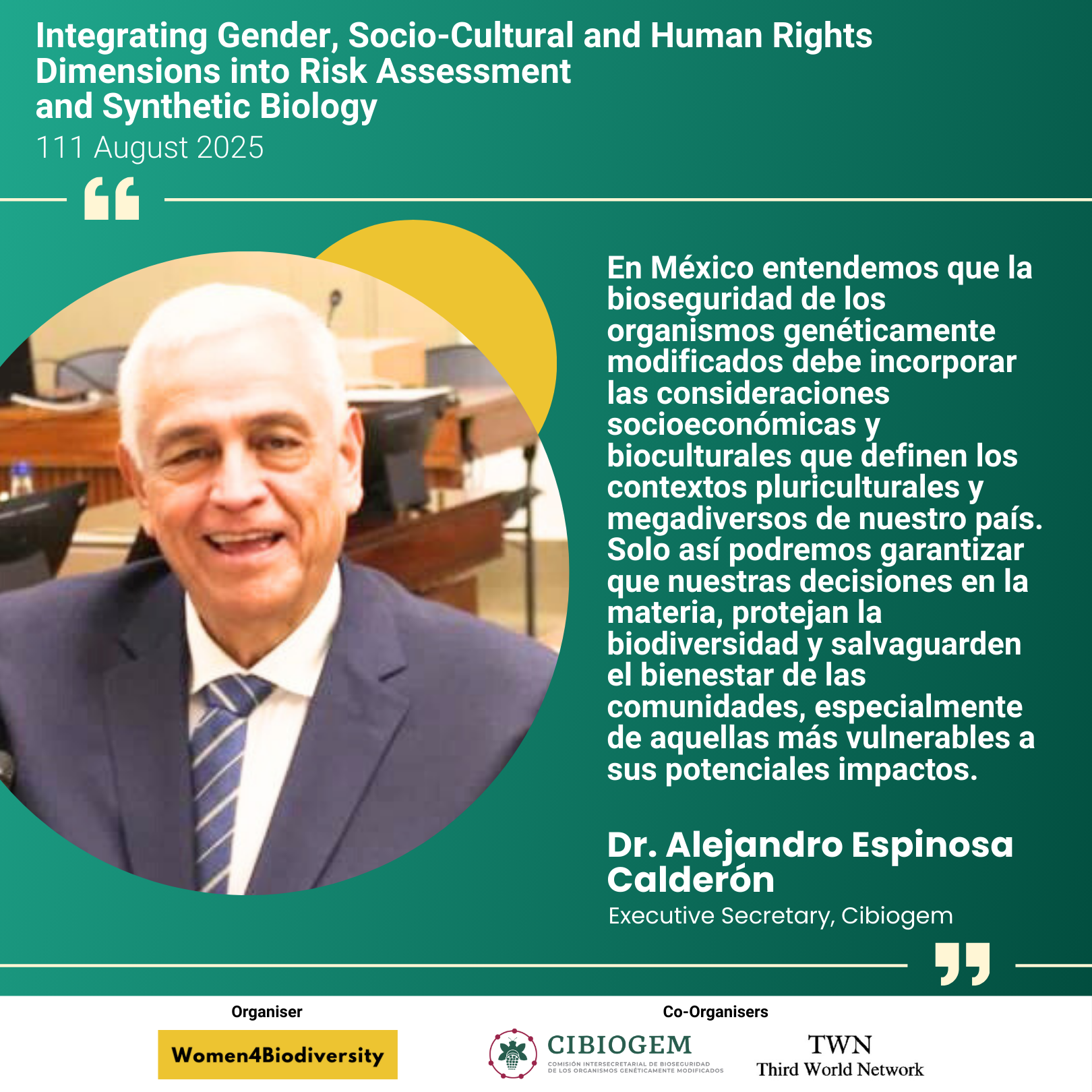
Lim Li Ching, Senior Researcher from Third World Network (TWN) outlined the evolution of synthetic biology discussions within the UNCBD, its Cartagena Protocol on Biosafety and Nagoya-Kuala Lumpur Supplementary Protocol on Liability and Redress. These frameworks established a precautionary framework for addressing the risks of living modified organisms (LMOs) and emerging synthetic biology applications. During the presentation, it was emphasised that while precautionary principles, public participation, and Indigenous rights are embedded in existing instruments, their implementation remains weak. She stressed that risk assessment methodologies must be updated to address gene drives and to integrate social, cultural, and ethical considerations alongside ecological impacts.
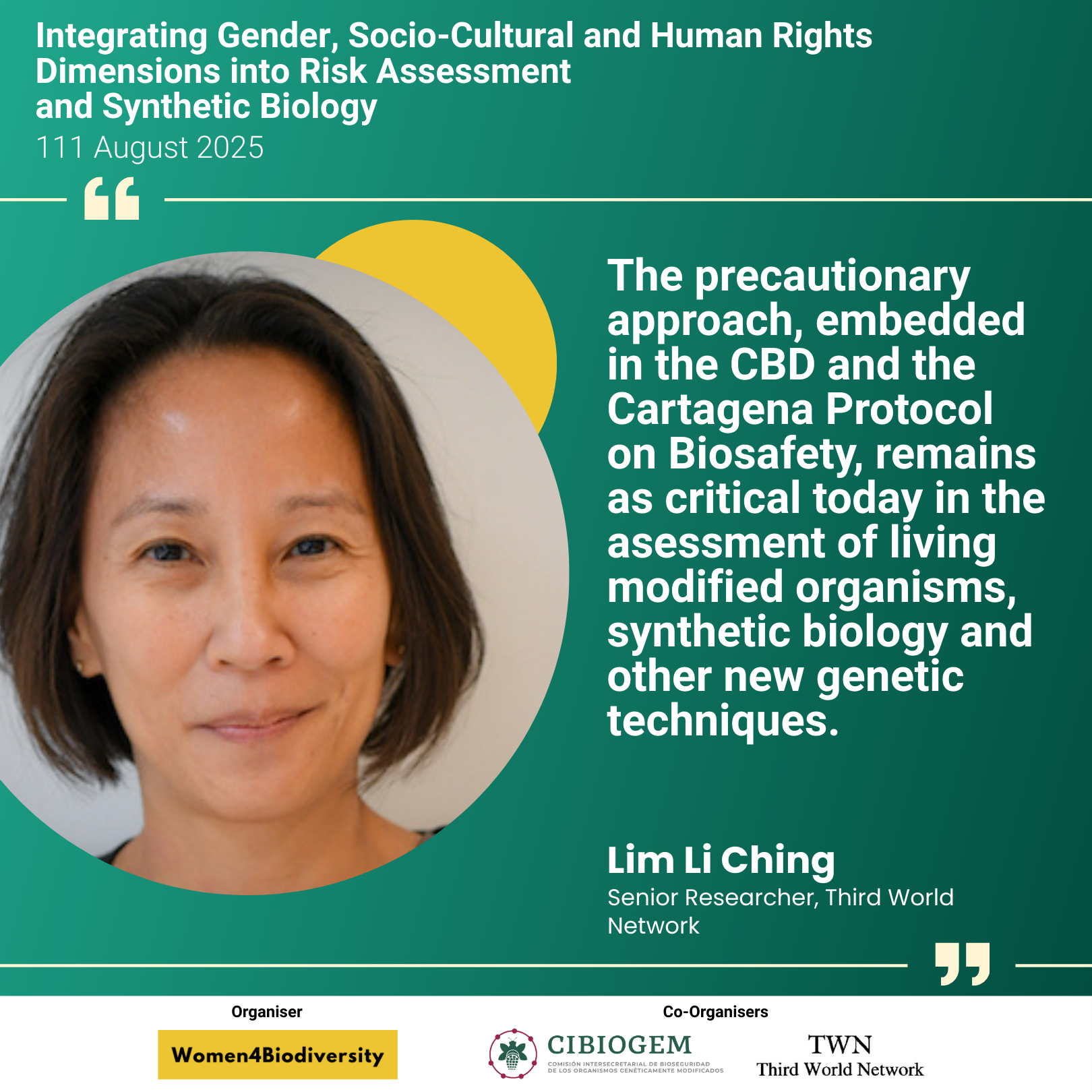
Dr Eva Sirinathsinghji, Researcher with the Third World Network (TWN), underscored that risk assessments cannot be reduced to technical narratives. Socio-economic, cultural, and gendered dimensions, including the knowledge and worldviews of small farmers, Indigenous Peoples and local communities, must shape decision-making and be central to risk assessment of LMOs and synthetic biology, as their impacts extend beyond health and environment. Developing countries, many of which are centres of origin for key crops, face particular risks where Indigenous Peoples and small farmers depend on biodiversity for livelihoods and cultural identity. The UNCBD and Cartagena Protocol already provide legal bases to respect Indigenous knowledge (Art. 8j) and integrate socio-economic considerations (Art. 26). To operationalise this, risk assessments should begin with participatory “problem formulation” processes, ensuring communities help define priorities, risks, and alternatives from the outset. Incorporating local expertise strengthens precautionary approaches, addresses uncertainties, and validates claims made by technology developers. Complementary socio-economic assessments, guided by CBD tools such as the Akwé: Kon guidelines, provide additional safeguards. Ultimately, holistic technology assessments, meaningful public participation at all stages, and the guarantee of Free, Prior and Informed Consent (FPIC) are essential to ensure that technical narratives do not override community knowledge and rights.
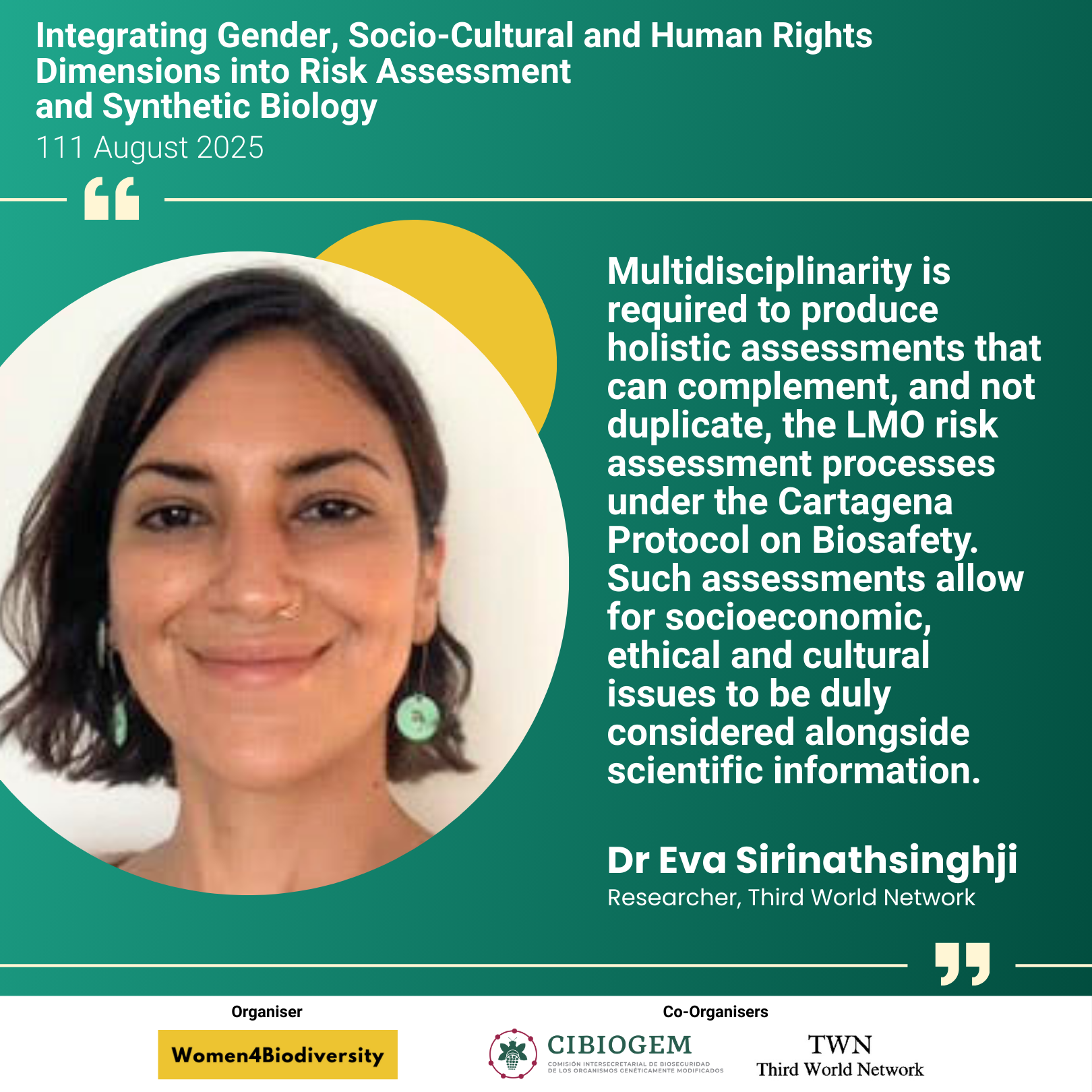
Mexico’s Challenges and Progress in Biosafety Regulation
Dr. Humberto Peraza, Deputy Director of Social Engagement and Socio-Economic Research at Cibiogem, and Dr. Consuelo López, Director of Information and Research Promotion at Cibiogem, described Mexico’s efforts to integrate socio-economic dimensions into GMO and synthetic biology governance. They pointed out that assessing the socio-economic impacts in Mexico is highly complex, combining technical, institutional, legal, and cultural challenges. The rapid evolution of synthetic biology, especially gene drives, stretches traditional risk assessment and regulatory frameworks. While Mexico’s Biosafety Law provides for socio-economic considerations, implementation remains limited and methodologically weak, resulting in incomplete evaluations. This is especially concerning for Indigenous, Afro-descendant, and rural communities whose livelihoods and cultural heritage depend on native crops like maize and cotton. Risks of genetic contamination and irreversible ecological and social impacts demand a more holistic, participatory, and interdisciplinary approach that incorporates gender, public health, and biocultural dimensions.
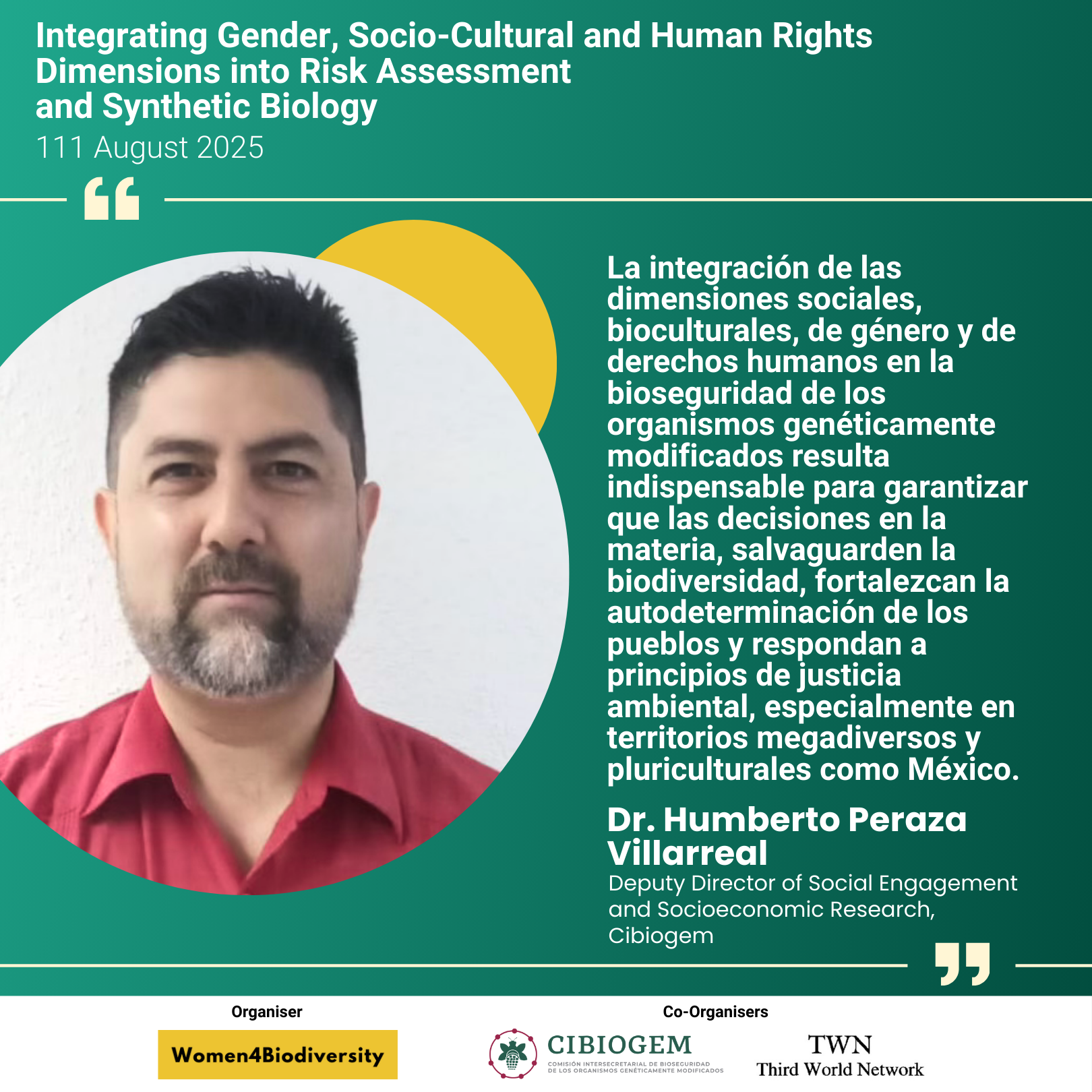
On the other hand, Dr. Consuelo López described actions already taken to address these gaps. Key initiatives include the establishment of a specialised subcommittee on genetically modified cotton, which compiled evidence across regulatory, scientific, and socio-economic dimensions, and the creation of GT-108, a protocol ensuring Free, Prior and Informed Consent (FPIC) for Indigenous, Afro-Mexican, and local communities before any GMO release. These mechanisms aim to guarantee culturally appropriate consultations and safeguard the right to self-determination. However, gaps remain, particularly in ensuring consultations integrate robust socio-economic analysis and meet international standards. Mexico’s experience underscores the urgent need to move beyond technocratic models and towards an inclusive biosafety governance framework that safeguards biodiversity, upholds human rights, and ensures justice for communities most affected by emerging technologies.
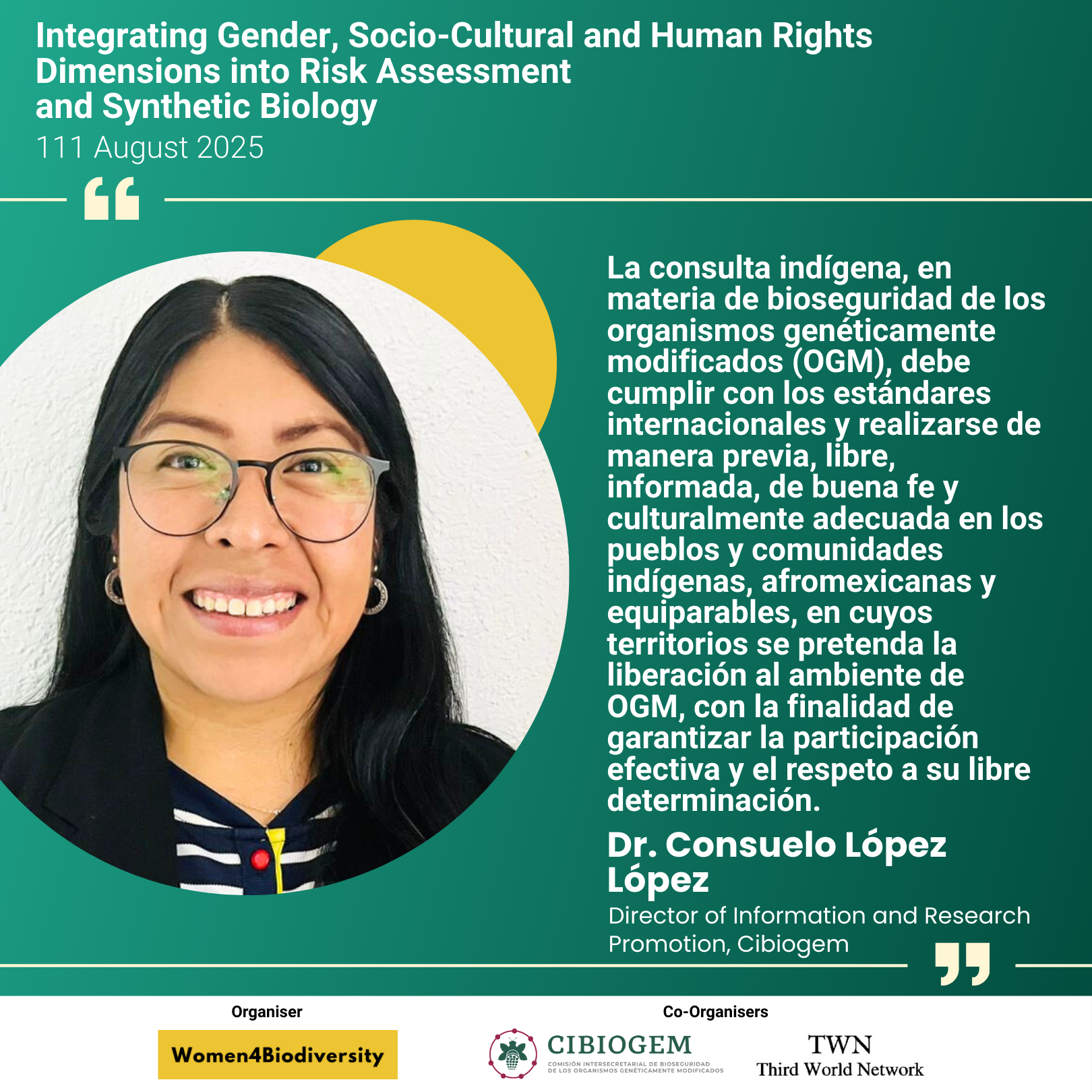
Peru’s Long-Term GMO Moratorium and Biodiversity Safeguards
David Castro, Director of the Directorate of Genetic Resources and Biosecurity, Government of Peru, highlighted the significant risk of genetic contamination in traditional crops, primarily through cross-border seed movements. He underscored that Peru has established a moratorium on the cultivation and environmental release of genetically modified organisms (GMOs), extended until 31 December 2035, a measure enacted to generate baseline data on the country’s genetic diversity and address the absence of full assessments on genetic flow contamination in centres of origin. Recognising that Peru’s megadiverse ecosystems and Indigenous communities are particularly vulnerable, Castro called for stronger monitoring systems and enhanced data generation. He also stressed the need to formally recognise and integrate Indigenous knowledge systems into biosafety assessments, especially for high-biodiversity contexts like the Amazon.
In conclusion, the webinar underscored the need for a multidisciplinary and inclusive approach to risk assessment in synthetic biology. Integrating gender, socio-cultural, and human rights perspectives is a matter of equity and a precondition for precautionary and effective biosafety governance. As Parties move forward with the thematic action plan on synthetic biology adopted at the Sixteenth meeting of the Conference of the Parties to the Convention on Biological Diversity (COP 16), ensuring meaningful participation of women, Indigenous Peoples and local communities will be essential to safeguard biodiversity and strengthen justice in decision-making.


